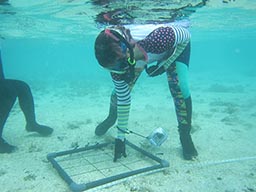- ABOUT US
- PROGRAM AREAS
- CONSERVATION APPROACH
- EDUCATION
- MULTIMEDIA
- NOAA Coral Reef Information System: Watershed Management
- NOAA Coral Reef Watch: VIIRS Satellite Ocean Color Monitoring
- NOAA Fisheries Office of Habitat Conservation: Shallow Coral Reef Habitat - What We Do
- NOAA Habitat Focus Areas
- NOAA Fisheries: Conserving Habitat in the Southeast
- NOAA National Centers for Coastal Ocean Science: Stressor Impacts and Mitigation
- NOAA Atlantic Oceanographic and Meteorological Laboratory: Experimental Reef Lab
- NOAA Fisheries: Coral Reefs in the Pacific
Reduce Land-Based Sources of Pollution

Impacts from land-based sources of pollution—including coastal development, deforestation, agricultural runoff, and oil and chemical spills—can impede coral growth and reproduction, disrupt overall ecological function, and cause disease and mortality in sensitive species. It is now well accepted that many serious coral reef ecosystem stressors originate from land-based sources, most notably toxicants, sediments, and nutrients.
Within the U.S., there are numerous locations where coral reef ecosystems are highly impacted by watershed alteration, runoff, and coastal development. On U.S. islands in the Pacific and Caribbean, significant changes in the drainage basins due to agriculture, deforestation, grazing of feral animals, fires, road building, and urbanization have increased the volume of land-based pollution released to adjacent coral reef ecosystems.
Many of these issues are made worse because of the geographic and climatic characteristics found in tropical island areas. Together they create unique management challenges.
What We Are Doing

The importance of identifying the extent and reducing these effects has now become crucial, as land-based pollution and coastal development put coral reef ecosystems around the nation at risk. The NOAA Coral Reef Conservation Program is actively engaged in efforts to monitor and mitigate the impacts of land-based pollution on coral reefs.
Our scientists teamed with local partners to complete the development of watershed management plans for priority watersheds in our seven U.S. coral reef areas. Now, work is underway to implement effective management practices and support research to grow our understanding of new technologies to reduce land-based sources of pollution. Additionally, we provide technical assistance to foster institutional partnerships and leverage financial resources to maximize our impact.
Response to Land-Based Sources of Pollution throughout NOAA
About Us

The NOAA Coral Reef Conservation Program was established in 2000 by the Coral Reef Conservation Act. Headquartered in Silver Spring, Maryland, the program is part of NOAA's Office for Coastal Management.

The Coral Reef Information System (CoRIS) is the program's information portal that provides access to NOAA coral reef data and products.
Work With US
U.S. Coral Reef Task Force
Funding Opportunities
Employment
Fellowship Program
Contracting Assistance
Graphic Identifier
Featured Stories Archive

Access the archive of featured stories here...
Feedback
Thank you for visiting NOAA’s Coral Reef Conservation Program online. Please take our website satisfaction survey. We welcome your ideas, comments, and feedback. Questions? Email coralreef@noaa.gov.
Stay Connected
Contact Us
NOAA’s Coral Reef Conservation Program
SSMC4, 10th Floor
1305 East West Highway
Silver Spring, MD 20910
coralreef@noaa.gov
